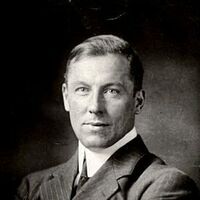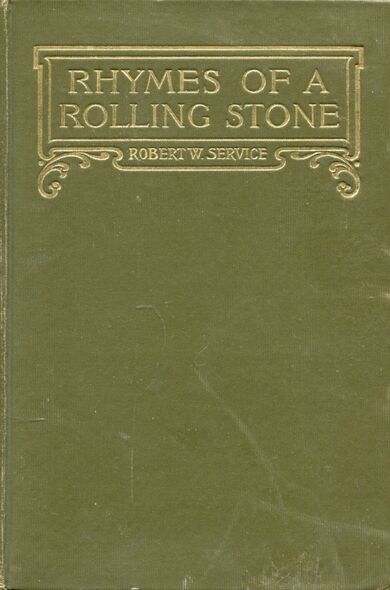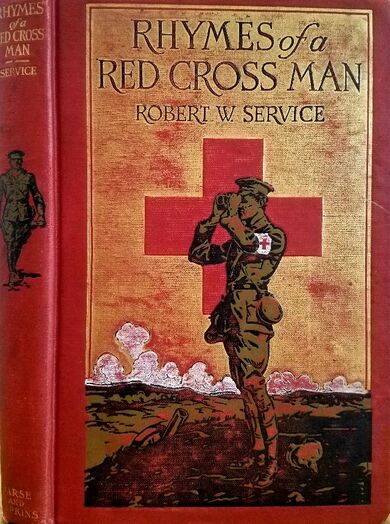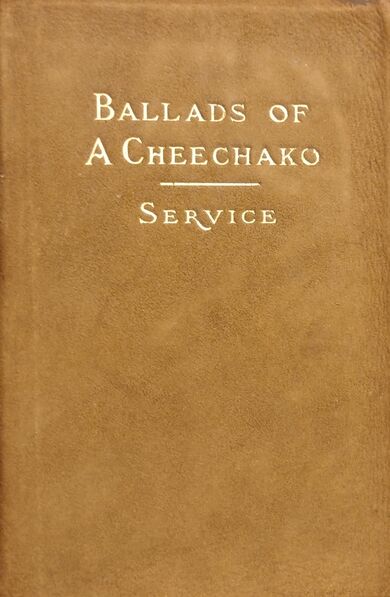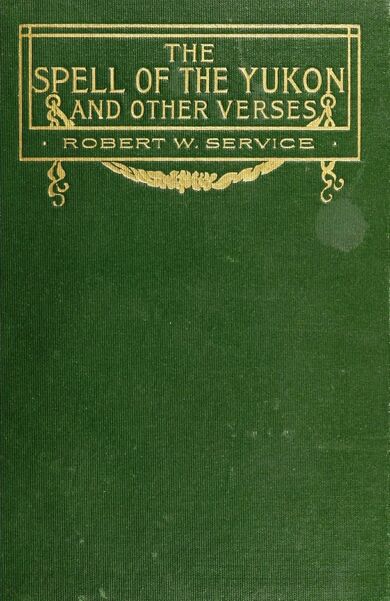I
Flat as a drum—head stretch the haggard snows;
The mighty skies are palisades of light;
The stars are blurred; the silence grows and grows;
Vaster and vaster vaults the icy night.
Here in my sleeping—bag I cower and pray:
“Silence and night, have pity! stoop and slay.”
I have not slept for many, many days.
I close my eyes with weariness—that’s all.
I still have strength to feed the drift—wood blaze,
That flickers weirdly on the icy wall.
I still have strength to pray: “God rest her soul,
Here in the awful shadow of the Pole.”
There in the cabin’s alcove low she lies,
Still candles gleaming at her head and feet;
All snow—drop white, ash—cold, with closed eyes,
Lips smiling, hands at rest—O God, how sweet!
How all unutterably sweet she seems. . . .
Not dead, not dead indeed—she dreams, she dreams.
II
“Sunshine”, I called her, and she brought, I vow,
God’s blessed sunshine to this life of mine.
I was a rover, of the breed who plough
Life’s furrow in a far—flung, lonely line;
The wilderness my home, my fortune cast
In a wild land of dearth, barbaric, vast.
When did I see her first? Long had I lain
Groping my way to life through fevered gloom.
Sudden the cloud of darkness left my brain;
A velvet bar of sunshine pierced the room,
And in that mellow glory aureoled
She stood, she stood, all golden in its gold.
Sunshine! O miracle! the earth grew glad;
Radiant each blade of grass, each living thing.
What a huge strength, high hope, proud will I had!
All the wide world with rapture seemed to ring.
Would she but wed me? YES: then fared we forth
Into the vast, unvintageable North.
III
In Muskrat Land the conies leap,
The wavies linger in their flight;
The jewelled, snakelike rivers creep;
The sun, sad rogue, is out all night;
The great wood bison paws the sand,
In Muskrat Land, in Muskrat Land.
In Muskrat Land dim streams divide
The tundras belted by the sky.
How sweet in slim canoe to glide,
And dream, and let the world go by!
Build gay camp—fires on greening strand!
In Muskrat Land, in Muskrat Land.
IV
And so we dreamed and drifted, she and I;
And how she loved that free, unfathomed life!
There in the peach—bloom of the midnight sky,
The silence welded us, true man and wife.
Then North and North invincibly we pressed
Beyond the Circle, to the world’s white crest.
And on the wind—flailed Arctic waste we stayed,
Dwelt with the Huskies by the Polar sea.
Fur had they, white fox, marten, mink to trade,
And we had food—stuff, bacon, flour and tea.
So we made snug, chummed up with all the band:
Sudden the Winter swooped on Husky Land.
V
What was that ill so sinister and dread,
Smiting the tribe with sickness to the bone?
So that we waked one morn to find them fled;
So that we stood and stared, alone, alone.
Bravely she smiled and looked into my eyes;
Laughed at their troubled, stern, foreboding pain;
Gaily she mocked the menace of the skies,
Turned to our cheery cabin once again,
Saying: “'Twill soon be over, dearest one,
The long, long night: then O the sun, the sun!”
VI
God made a heart of gold, of gold,
Shining and sweet and true;
Gave it a home of fairest mould,
Blest it, and called it—You.
God gave the rose its grace of glow,
And the lark its radiant glee;
But, better than all, I know, I know
God gave you, Heart, to me.
VII
She was all sunshine in those dubious days;
Our cabin beaconed with defiant light;
We chattered by the friendly drift—wood blaze;
Closer and closer cowered the hag—like night.
A wolf—howl would have been a welcome sound,
And there was none in all that stricken land;
Yet with such silence, darkness, death around,
Learned we to love as few can understand.
Spirit with spirit fused, and soul with soul,
There in the sullen shadow of the Pole.
VIII
What was that haunting horror of the night?
Brave was she; buoyant, full of sunny cheer.
Why was her face so small, so strangely white?
Then did I turn from her, heart—sick with fear;
Sought in my agony the outcast snows;
Prayed in my pain to that insensate sky;
Grovelled and sobbed and cursed, and then arose:
“Sunshine! O heart of gold! to die! to die!”
IX
She died on Christmas day—it seems so sad
That one you love should die on Christmas day.
Head—bowed I knelt by her; O God! I had
No tears to shed, no moan, no prayer to pray.
I heard her whisper: “Call me, will you, dear?
They say Death parts, but I won’t go away.
I will be with you in the cabin here;
Oh I will plead with God to let me stay!
Stay till the Night is gone, till Spring is nigh,
Till sunshine comes . . . be brave . . . I’m tired . . . good—bye. . . .”
X
For weeks, for months I have not seen the sun;
The minatory dawns are leprous pale;
The felon days malinger one by one;
How like a dream Life is! how vain! how stale!
I, too, am faint; that vampire—like disease
Has fallen on me; weak and cold am I,
Hugging a tiny fire in fear I freeze:
The cabin must be cold, and so I try
To bear the frost, the frost that fights decay,
The frost that keeps her beautiful alway.
XI
She lies within an icy vault;
It glitters like a cave of salt.
All marble—pure and angel—sweet
With candles at her head and feet,
Under an ermine robe she lies.
I kiss her hands, I kiss her eyes:
“Come back, come back, O Love, I pray,
Into this house, this house of clay!
Answer my kisses soft and warm;
Nestle again within my arm.
Come! for I know that you are near;
Open your eyes and look, my dear.
Just for a moment break the mesh;
Back from the spirit leap to flesh.
Weary I wait; the night is black;
Love of my life, come back, come back!”
XII
Last night maybe I was a little mad,
For as I prayed despairful by her side,
Such a strange, antic visioning I had:
Lo! it did seem her eyes were open wide.
Surely I must have dreamed! I stared once more. . . .
No, ’twas a candle’s trick, a shadow cast.
There were her lashes locking as before.
(Oh, but it filled me with a joy so vast!)
No, ’twas a freak, a fancy of the brain,
(Oh, but to—night I’ll try again, again!)
XIII
It was no dream; now do I know that Love
Leapt from the starry battlements of Death;
For in my vigil as I bent above,
Calling her name with eager, burning breath,
Sudden there came a change: again I saw
The radiance of the rose—leaf stain her cheek;
Rivers of rapture thrilled in sunny thaw;
Cleft were her coral lips as if to speak;
Curved were her tender arms as if to cling;
Open the flower—like eyes of lucent blue,
Looking at me with love so pitying
That I could fancy Heaven shining through.
“Sunshine,” I faltered, “stay with me, oh, stay!”
Yet ere I finished, in a moment’s flight,
There in her angel purity she lay—
Ah! but I know she’ll come again to—night.
Even as radiant sword leaps from the sheath
Soul from the body leaps—we call it Death.
XIV
Even as this line I write,
Do I know that she is near;
Happy am I, every night
Comes she back to bid me cheer;
Kissing her, I hold her fast;
Win her into life at last.
Did I dream that yesterday
On yon mountain ridge a glow
Soft as moonstone paled away,
Leaving less forlorn the snow?
Could it be the sun? Oh, fain
Would I see the sun again!
Oh, to see a coral dawn
Gladden to a crocus glow!
Day’s a spectre dim and wan,
Dancing on the furtive snow;
Night’s a cloud upon my brain:
Oh, to see the sun again!
You who find us in this place,
Have you pity in your breast;
Let us in our last embrace,
Under earth sun—hallowed rest.
Night’s a claw upon my brain:
Oh, to see the sun again!
XV
The Sun! at last the Sun! I write these lines,
Here on my knees, with feeble, fumbling hand.
Look! in yon mountain cleft a radiance shines,
Gleam of a primrose—see it thrill, expand,
Grow glorious. Dear God be praised! it streams
Into the cabin in a gush of gold.
Look! there she stands, the angel of my dreams,
All in the radiant shimmer aureoled;
First as I saw her from my bed of pain;
First as I loved her when the darkness passed.
Now do I know that Life is not in vain;
Now do I know God cares, at last, at last!
Light outlives dark, joy grief, and Love’s the sum:
Heart of my heart! Sunshine! I come . . . I come. . . .

